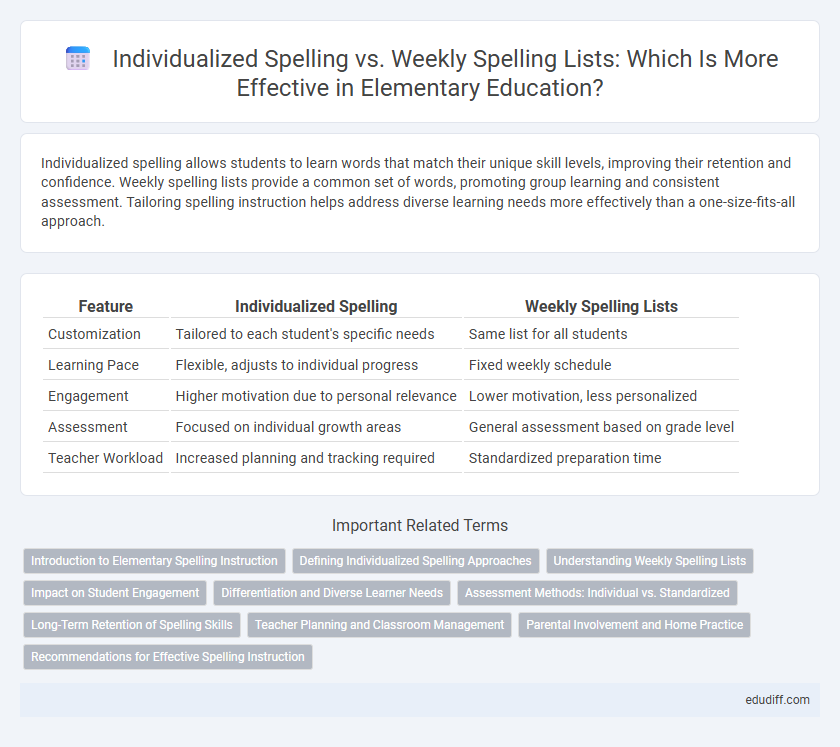Individualized spelling allows students to learn words that match their unique skill levels, improving their retention and confidence. Weekly spelling lists provide a common set of words, promoting group learning and consistent assessment. Tailoring spelling instruction helps address diverse learning needs more effectively than a one-size-fits-all approach.
Table of Comparison
| Feature | Individualized Spelling | Weekly Spelling Lists |
|---|---|---|
| Customization | Tailored to each student's specific needs | Same list for all students |
| Learning Pace | Flexible, adjusts to individual progress | Fixed weekly schedule |
| Engagement | Higher motivation due to personal relevance | Lower motivation, less personalized |
| Assessment | Focused on individual growth areas | General assessment based on grade level |
| Teacher Workload | Increased planning and tracking required | Standardized preparation time |
Introduction to Elementary Spelling Instruction
Elementary spelling instruction benefits from individualized spelling approaches tailored to each student's unique needs, promoting better retention and engagement. In contrast, weekly spelling lists offer uniformity but may not address varying skill levels or learning paces effectively. Personalized spelling programs enhance vocabulary development and reinforce phonetic patterns more efficiently than one-size-fits-all weekly lists.
Defining Individualized Spelling Approaches
Individualized spelling approaches tailor word lists to each student's unique needs, focusing on their specific spelling patterns and common errors to enhance learning. This method allows for targeted practice and faster mastery by addressing personal challenges instead of following a one-size-fits-all weekly spelling list. Research shows that personalized spelling instruction improves retention and motivates students by aligning with their current developmental stage and vocabulary acquisition.
Understanding Weekly Spelling Lists
Weekly spelling lists provide a consistent structure for students to learn and practice new vocabulary over time, promoting gradual retention through repetition. This method allows teachers to assess spelling proficiency regularly, identifying common errors and areas needing improvement. By focusing on specific word patterns each week, students develop stronger phonemic awareness and decoding skills essential for reading and writing fluency.
Impact on Student Engagement
Individualized spelling lists boost student engagement by tailoring word selection to each student's learning needs, increasing motivation and confidence. Weekly spelling lists often fail to address individual differences, leading to disengagement and frustration. Personalized spelling practice encourages active participation and improves retention by focusing on relevant vocabulary.
Differentiation and Diverse Learner Needs
Individualized spelling addresses diverse learner needs by tailoring word lists to each student's current abilities and progress, promoting targeted skill development. Weekly spelling lists often provide a one-size-fits-all approach, which may not sufficiently challenge advanced students or support those requiring extra practice. Differentiation through individualized spelling enhances engagement and mastery by adapting to varying levels of proficiency and learning styles within the elementary classroom.
Assessment Methods: Individual vs. Standardized
Individualized spelling assessment focuses on measuring a student's unique spelling abilities through personalized tests tailored to their learning progress, allowing for targeted feedback and growth. Weekly standardized spelling lists use uniform words for all students, providing a consistent measure of group performance but possibly overlooking individual challenges. Choosing between these methods depends on whether the goal is to address specific student needs or to evaluate overall classroom proficiency.
Long-Term Retention of Spelling Skills
Individualized spelling programs tailor word lists to each student's unique errors and learning pace, enhancing long-term retention by targeting specific needs. Weekly spelling lists often present uniform words to all students, which may not address individual challenges, leading to less effective memory retention. Research shows that personalized spelling practice improves mastery and reduces the need for repeated remediation over time.
Teacher Planning and Classroom Management
Individualized spelling enhances teacher planning by allowing targeted instruction that meets each student's unique learning needs, reducing time spent on reteaching common errors. Weekly spelling lists simplify classroom management by providing a consistent structure and predictable routine, making it easier to organize assessments and monitor progress. Balancing individualized approaches with weekly lists supports efficient lesson preparation and promotes student engagement through personalized and systematic practice.
Parental Involvement and Home Practice
Individualized spelling lists tailored to each child's needs boost parental involvement by allowing parents to support specific learning goals at home. Weekly spelling lists often lead to uniform practice that may not address individual weaknesses, reducing effective home practice time. Personalized spelling approaches encourage targeted reinforcement, making parent-led practice more meaningful and productive.
Recommendations for Effective Spelling Instruction
Individualized spelling instruction tailors word lists to each student's current knowledge, enhancing retention and motivation. Weekly spelling lists, while traditional, often fail to address diverse learning needs and can lead to disengagement. Effective spelling instruction combines personalized word selection with consistent practice and timely feedback to improve mastery.
Individualized Spelling vs Weekly Spelling Lists Infographic

 edudiff.com
edudiff.com